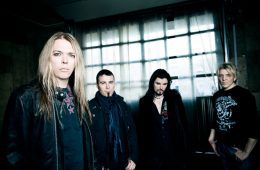APOCALYPTICA
APOCALYPTICA: Official Lyric Video For ‘House Of Chains’ Song
The official lyric video for the song "House Of Chains" from APOCALYPTICA...
APOCALYPTICA: New Song ‘Till Death Do Us Part’ Available For Streaming
"Till Death Do Us Part", a brand new song from cello rockers APOCALYPTICA, ...
APOCALYPTICA Announces North American Headlining Tour
Finnish cello rockers APOCALYPTICA — accompanied by their American lead ...
Video Premiere: APOCALYPTICA’s ‘Cold Blood’
"Cold Blood", the new video from cello rockers APOCALYPTICA, can be seen above.
APOCALYPTICA’s TOPPINEN Says ‘Shadowmaker’ Album Is ‘Full Of Attitude’
Eicca Toppinen of Finnish cello rockers APOCALYPTICA recently spoke to ...
APOCALYPTICA Signs With ELEVEN SEVEN MUSIC
Eleven Seven Music Group has announced...
APOCALYPTICA Putting Finishing Touches On Eighth Album
Innovative Finnish cello rockers APOCALYPTICA are putting the finishing touches on their eighth full-length studio album, to be released early 2015.
Following the release of "7th Symphony", APOCALYPTICA took a break from the standard album cycle in 2013 to pursue a range of musical projects. While Eicca Toppinen switched to drums in his side band CHERRY AND THE VIPERS, Mikko Sirén played his instrument on the new EMIGRATE album, Richard Kruspe's (RAMMSTEIN) project. Mikko also performed with Cheek, Finland's biggest hip-hop artist, selling out Helsinki's Olympic Stadium twice. Paavo Lötjönen collaborated with Tipe Johnson (LENINGRAD COWBOYS, APOCALYPTICA) and Perttu Kivilaakso earned the feuilleton's acclaim with celebrated chamber music appearances. Additionally, APOCALYPTICA composed new material and performed live in the multimedia event "Wagner Reloaded" by award-winning choreographer Gregor Seyffert.
Earlier this year, APOCALYPTICA's latest project, "Apocalyptic Symphony", embarked on its first-ever tour with a classical ensemble, the Avanti! Chamber Orchestra.
APOCALYPTICA To Release ‘Ass-Kicking’ New Studio Album In 2014
APOCALYPTICA — the groundbreaking Finnish orchestral rock group — has just released "Wagner Reloaded - Live In Leipzig" (BMG), an epic live collaboration with the acclaimed MDR Leipzig Symphony Orchestra. The album's release is perfectly timed since 2013 marks the 200th anniversary of the birth of iconic German composer Richard Wagner.
For "Wagner Reloaded - Live In Leipzig", APOCALYPTICA created new compositions based on Wagner's body of work and his life, teaming with award-winning choreographer and dancer Gregor Seyffert to stage a brilliant and magical, cross-genre event featuring a live concert and theatrical production.
Since its inception, the Finnish cello-based heavy rock group APOCALYPTICA has been mining the classical form and structure creating compositions that are both unpredictable and unforgettable. From the METALLICA covers that turned the music scene on its ear to 2007's "Worlds Collide" — which saw the group collaborate with everyone from SLIPKNOT's Corey Taylor to RAMMSTEIN's Till Lindemann and LACUNA COIL's Cristina Scabbia — APOCALYPTICA have released seven studio albums featuring numerous cello-based instrumentals and vocal-based songs. They've explored styles from atmospheric interludes to fast, battering rhythms--their music has always been gripping, dynamic and full of melody.
Here's a question-and-answer session with APOCALYPTICA's Eicca Toppinen and Mikko Sirén where they discuss the controversial character of composer Richard Wagner, performing inside metal dragons with pyro as well as the creation of the music and production for "Wagner Reloaded".
Q: What role did Wagner play in the decision for this project?
Eicca: Wagner was both the whole starting point and the glue. "Wagner Reloaded" is not just an homage to Wagner and performance of his music, it's more about showing Wagner's life and character and personality in a new way.
Mikko: Wagner's whole career was an inspiring element for the creator Gregor, he wanted to make a movie out of it and for APOCALYPTICA to make a score for it, so, it was a new approach to his life and I think his life was more interesting for Gregor than his music even. That's the contradiction.
Eicca: Yes, that's very true and it turned out to be so bombastic and massive, which is "Wagnerian," it's really in the spirit of Wagner, because he was famous for being over the top. Wagner wanted to make a 12-hour opera, opera trilogies, and he wanted to build his own opera house — his visions were crazy. Wagner's craziness was driving this project from the very beginning.
Q: In Germany, there are controversies regarding Wagner's life and personal political choices. How is that looked at in Finland?
Mikko: In general, at least in Finland, people don't look at Wagner as a political character or a person; his music is well-known, and people, who follow the scene, which in truth is a minority of people, might know more of his history.
Eicca: Yeah, it doesn't stir up such emotions in Finland as it seems to in Germany, of course. It's a complicated issue, because nobody knows exactly how to think about people, who have already passed away long, long, long time ago. Whether their music or art was used for certain purposes — it's complex territory. But in Finland, people listen to Wagner just as Wagner music and don't think so much about possible political relations, or anti-Semitic writings. It's not really at the top of the conversation in Finland. But in Germany it seems to be a hot topic.
Q: Musically speaking, what were the greatest challenges?
Eicca: The greatest challenge of doing this project was the way we worked. Gregor Seyffert, who was also dancing one of the main roles, had a very clear script for how all the scenes would follow each other, how Wagner was born, was a kid, and I got a length for every scene. Like, for example: This scene is four to five minutes long, and this is what's going to happen on stage, and this is what the energy of the music should be like. And sometimes Gregor wanted to have a specific composition by Wagner and therefore maybe the biggest challenge was to combine Wagner's music with new music, because Wagner, of course, was a great composer and a lot of his music is perfect and there is nothing to add to it. So it was a combination of what is APOCALYPTICA's role in the Wagner pieces, and how we could create music, which is as exciting in the performance as Wagner's original music. Because all of APOCALYPTICA's music was newly composed for this project, no one had ever heard it before — and everybody knows all of Wagner. The
APOCALYPTICA: ‘Wagner Reloaded – Live In Leipzig’ EPK Released
APOCALYPTICA — the groundbreaking Finnish orchestral rock group — will release "Wagner Reloaded - Live In Leipzig", an epic live collaboration with the acclaimed MDR Leipzig Symphony Orchestra, November 19 on BMG. The album's release is perfectly timed since 2013 marks the 200th anniversary of the birth of iconic German composer Richard Wagner.
A 16-minute EPK (Electronic Press Kit) about the making of "Wagner Reloaded - Live In Leipzig" can be seen below.
For "Wagner Reloaded - Live In Leipzig", APOCALYPTICA created new compositions based on Wagner's body of work and his life, teaming with award-winning choreographer and dancerGregor Seyffert to stage a brilliant and magical, cross-genre event featuring a live concert and theatrical production.
"We've been asked many times to do this type of project, but this is the first one we got excited about," explains APOCALYPTICA's Eicca Toppinen. "The mission was to celebrate Wagner, [so] we took elements of his life and used his original music and rearranged it,"Toppinen adds. "It was like writing a score for a movie, I had a list of themes and I had to think about the length of scenes and write the music while envisioning APOCALYPTICAperforming on a massive stage with the symphony, choir and one-hundred dancers."
"Ludwig Wonderland", the first clip for "Wagner Reloaded", can be seen below. It is the first in a chronological set of three clips total to be published in shorter intervals towards the release of the live CD.
May 22, 2013 was the 200th anniversary of the birth of the composer Richard Wagner. The Berlin choreographer, award-winning dancer and artistic director of the Berlin State School of Ballet Gregor Seyffert (best dancer in the world, winner of the German dance award) staged an exceptional cross-genre spectacle with a combination of dance, artistry, object theatre, audiovisual media and a live concert that enabled audiences to experience the oeuvre ofRichard Wagner. The focus was not on individual works or dramas but on visual presentation of the unique life and work of Richard Wagner, presented on stage in this form for the very first time.
To stage the theme and Wagner's biography in a contemporary way, Gregor Seyffert wanted to create new musical highlights by bringing today's popular rock music together with compositions by Richard Wagner. A contemporary equivalent was created by the compositions of the Finnish cello-rock band APOCALYPTICA, which, with its unmistakable sound, provides a bridge to modern popular music.



